On November 21st, the Museum of Food and Drink (MOFAD) invites you to join them at Essex Market for a memorable gala dedicated to celebrating New York City’s vibrant street food history. Proceeds from the event will help fund MOFAD and its upcoming 2025 exhibitions.
The Museum of Food and Drink is a pioneering food museum that leverages the universal nature of food to foster cultural change and promote a more thoughtful, equitable, and delicious future. Through immersive exhibits that engage the senses, MOFAD serves as a global educational resource, inspiring curious eaters of all ages and backgrounds.
This year’s gala will honor Niki Russ Federman, Josh Russ Tupper, and Maria and Mark Russ Federman of the iconic Russ & Daughters. Founded by Joel Russ over a century ago with a humble herring cart, this family-run business has become a cornerstone of NYC’s food culture. Beyond preserving their own legacy, the Russ family actively champions the city’s independent restaurants through their work with the Independent Restaurant Coalition (IRC), helping to protect and strengthen NYC’s vibrant culinary landscape.
Guests will be treated to a menu inspired by NYC’s diverse street food traditions, with dishes that reflect over two centuries of culinary history. The evening will also feature a special toast to NYC’s Black oystermen, with cocktails crafted from the only vodka distilled with 100% New York corn and locally harvested oysters.
Tickets are still available on MOFAD’s website—don’t miss your chance to be part of this unforgettable evening! Raise a glass, savor extraordinary dishes, and help shape the future of this unique museum and the communities it celebrates. Secure your tickets now for an inspiring night of food, culture, and connection!
Bring a true taste of NYC to your event with Great Performances’ Russ & Daughters activation. For over 110 years, Russ & Daughters has been a New York icon, celebrated for its smoked fish, caviar, latkes, and more. With locations from the Lower East Side to Hudson Yards, this legendary brand can now bring its authentic flavors to your gathering.
Wedding Planning Q&A with Amanda DiUglio
Congratulations on your engagement! After celebrating this momentous occasion, it’s time to jump into the exciting world of wedding planning. We turned to our resident wedding expert, Amanda DiUglio, who has successfully planned hundreds of weddings for Great Performances, to answer some common questions couples have during this journey.
Q: What’s the first thing a couple should do after they get engaged?
Amanda: After you’ve celebrated the moment, take in the fun! Enjoy this time together, as the planning will happen quickly. The next big step is to decide where you want to get married. Find the perfect venue first, and the rest will really fall in line.
Q: How soon should a couple start planning? Is there a ‘sweet spot’ for timing?
Amanda: Each client is different. If there’s a must-have date or venue, the sooner, the better. If you’re flexible with details, you can take a little more time to enjoy being engaged.
Q: What are the top priorities couples should focus on?
Amanda: Budget is one of the biggest factors. It’s heartbreaking for a couple to fall in love with a venue that’s outside of their budget. Determine how much you want to spend, and then explore options within that range.
Q: What are a few main things to keep in mind while touring venues?
Amanda: Consider whether the venue fits your wedding vision, if there’s a rain plan in place, and where each significant moment of the day will happen. It’s important to visualize the flow of your event.
Q: At what point should I get a planner, and what are the benefits of having one?
Amanda: This depends on how hands-on you want to be. Full planners can help execute everything from start to finish, while others offer various packages that might better fit your level of involvement.
Q: What key questions should couples ask a potential wedding planner during their consultation?
Amanda: It’s all about personality. Make sure you like the person you’re working with! A good rapport will lead to a smoother planning process.
Q: How would you recommend picking a date?
Amanda: This is such a personal question! Think about what matters most to you: Is the weather important? Do you have a favorite flower? Do you prefer an outdoor or indoor setting? All these factors will play into your date selection.
Q: What are some common mistakes you’ve seen couples make in the planning process?
Amanda: Talk to the professionals! We all want the day to go smoothly for each couple. When we make recommendations, it’s based on experience. Even if it doesn’t align with your exact vision, we’re here to help you avoid common pitfalls.
Q: What’s the best way to keep the planning process from feeling overwhelming?
Amanda: Hire a planner! Let the professionals handle the details so you can enjoy the process. It makes a huge difference.
Q: Are there any current trends or ‘must-haves’ that couples are requesting?
Amanda: We’re seeing a lot of interactive moments this year. For example, several couples want us to build their wedding cake live in the traditional Italian style, allowing guests to watch and enjoy the experience!
Q: What is one piece of advice you would give a newly engaged couple?
Amanda: It all goes by so fast! Try to relax and enjoy the special moments instead of just checking them off your list. This is a beautiful time in your life—savor it!
Q: What’s a cute engagement story a couple has shared with you?
Amanda: One of our clients met in preschool! They found all their old photos from when they were kids and incorporated that into their story for the night. It was such a charming touch!
As you embark on this exciting journey of wedding planning, remember to savor each moment and embrace the joy of being engaged. With Amanda’s expert advice, you’re equipped to make thoughtful decisions about your venue, budget, and the overall vision for your special day.
We’re here when you’re ready to embark on your next steps! Here at Great Performances, we’re happy to work with you and your planner to create a beautiful day crafted just for you and your partner. Together, we’ll ensure your wedding is not just an event but a memorable celebration of your love story!
The 22nd Annual Open House New York (OHNY) Weekend brought the city to life with unique glimpses into some of New York’s most remarkable spaces. Great Performances (GP) was honored to be part of this incredible celebration, sponsoring and catering the OHNY Weekend Launch Party and welcoming guests into our Bronx headquarters for exclusive tours. From classic New York street food to our signature culinary creations, GP infused the events with a taste of New York’s diversity and flair.
The OHNY Weekend Launch Party at United Palace
The iconic United Palace in Washington Heights set the stage for the OHNY Weekend launch. Nearly 400 guests gathered in sequins, gold, and eclectic styles, kicking off this beloved celebration with an evening filled with community, music, and New York spirit. GP was proud to sponsor and cater this event, where we showcased a classic New York-inspired menu that perfectly complemented the vibrant venue.
The Menu
Classic NY Street Food with a Twist
Our menu honored New York’s street food culture, serving up Kosher All-Beef Hot Dogs with classic toppings like ketchup and mustard on Martin’s long potato rolls, alongside Vegan Hot Dogs with a twist—featuring kale pesto, pickled shallots, and spiced sunflower seeds on a vegan bun.
Special Bites
We also brought in GP’s famous Thunder Pickle Spears and warm, freshly baked Soft Pretzels with Deli Mustard, a perfect snack for mingling in this grand space.
A Global Taste with Eat Offbeat
Highlighting New York’s global flavors, we collaborated with Eat Off Beat to serve Pollo Guisado and Caraotas Negras, two Venezuelan dishes that added a unique touch to the event.
Sweet Finale
To round off the night, guests indulged in select desserts, each crafted to add sweetness to the celebration.
OHNY Weekend: A Three-Day Festival Across 270+ Sites
October 18-20 marked three unforgettable days where tens of thousands of New Yorkers and visitors explored 271 sites across the five boroughs. OHNY Weekend continues to bring the city’s rich architecture and hidden gems to the public, deepening connections and creating moments of discovery.
Behind the Scenes at Great Performances’ Bronx Headquarters
GP welcomed guests for three packed tours of our Bronx office and commissary, offering an insider look at the heart of our operations. Visitors got to see firsthand how our commitment to quality, sustainability, and creativity comes to life.
Starting at Mae Mae Cafe
We kicked off each tour in our Bronx-based cafe and plant shop, Mae Mae, where guests enjoyed the cozy ambiance and greenery before heading into our bustling kitchen spaces.
Exploring Our Culinary Process
From loading docks to pantries and walk-in refrigerators, guests traced the journey of our ingredients from delivery to final preparation in our hot and cold kitchens, seeing how each element is crafted to retain freshness and flavor.
Design and Presentation
A visit to our warehouse and design space revealed over 2,000 custom trays, serving pieces, and decor items used to elevate events. This glimpse into our design inventory showed the creative range we bring to each event, whether it’s a rustic gathering or an elegant gala.
Pastry Kitchen and Special Treats
In our pastry kitchen, guests watched our chefs in action and received a parting gift: Chef Albert Bello’s beloved chocolate chip cookies. These cookies, known for their ideal chewy-crispy texture and rich brown sugar and chocolate flavor, made for the perfect takeaway and a sweet memory of their visit.
OHNY Weekend is more than a citywide festival—it’s a tribute to New York City’s diversity, history, and shared spaces. Great Performances is proud to support OHNY’s mission and delighted to bring our culinary artistry to this year’s celebration. As we shared classic New York flavors and gave visitors a glimpse into our creative process, we felt the true spirit of OHNY: opening doors and connecting communities in meaningful ways.
Photography: Main image; Galleries 1 & 2 by Jenna Bascomb; Gallery 3 by Hechler Photographers
Set against the stunning backdrop of the glittering Manhattan skyline, the Brooklyn Black Tie Ball was an enchanting evening hosted by the Brooklyn Bridge Park Conservancy at New York City’s most breathtaking waterfront park.
Senior Event Director, Lauren Tregor, spearheaded this 600-person seated dinner. Join us in reliving the magic of the night through our photo gallery below, showcasing the breathtaking ambiance, honored guests, and the exquisite culinary experience that made this event truly unforgettable.
This year’s gala honored four remarkable champions of the park: Daniel L. Doctoroff, Regina Myer, Nanette Smith, and the landscape architects of MVVA, who have played pivotal roles in bringing the Brooklyn waterfront vision to life. The evening was a celebration of joy, wonder, and exploration, with supporters rallying around the Conservancy’s commitment to providing free access to cultural, fitness, and educational experiences for all New Yorkers.
Guests were treated to a thoughtfully crafted menu that highlighted the best of seasonal cuisine, beginning with delightful butlered hors d’oeuvres like Green Chickpea Pani Puri and Lobster & Corn Tart. The meal progressed to an elegant first course of Burrata and Apple, followed by a choice of Roasted Branzino or a delicious vegetarian option. Desserts featured a stunning Maple Choux, alongside an array of butlered treats.
The evening’s menu included:
- Cocktail: Maple Old Fashioned
- Butlered Hors d’Oeuvres:
- Green Chickpea Pani Puri
- Lemon Confit Potatoes
- Crispy Arancini
- Lobster & Corn Tart
- Pulled Poblano Lime Chicken
- Savory Bread Pudding
- Duck Banh Mi Summer Roll
- Steak Frites
- First Course: Burrata and Apple
- Entrée: Roasted Branzino (Vegetarian option: Smoked Eggplant)
- Plated Dessert: Maple Choux, Bowl of Fresh Berries
- Butlered Desserts: Dark Chocolate Raspberry Truffles, Fresh Fruit Tartlet
On a beautiful evening at Hall des Lumières, guests gathered for an unforgettable night dedicated to supporting the future of Governors Island. This nonprofit gala, attended by 400 guests, celebrated the island’s transformative initiatives, including public art, innovative climate solutions, and the preservation of open spaces.
Produced by Senior Event Director, Gary Bedigan, this 400-person cocktail reception was a visually stunning event for a nonprofit organization we’re always delighted to support.
Honoring Remarkable Leaders
The event honored inspiring individuals:
- Andy Darrell, Senior Advisor at the Environmental Defense Fund, whose work is pivotal in advancing environmental policies.
- Charles Gaines, a renowned artist whose innovative works challenge perceptions and provoke thought.
- Maria Torres-Springer, Deputy Mayor for Housing, Economic Development & Workforce, who plays a crucial role in shaping New York City’s future.
Engaging the Senses and the Sensibilities
Hall des Lumières allowed the team to create a one-of-a-kind immersive experience thanks to cutting-edge projection technology. The space was transformed into a breathtaking visual landscape: Governor’s Island.
Not only was this a visual delight, the event was a culinary delight. As guests mingled amid the stunning projections showcasing scenes from Governors Island, they enjoyed a variety of butlered dishes, several curated buffet stations, and delectable cocktails.
We’re thrilled to be partners of Governors Island collaborate with them on events that champion vital initiatives for our community. The success of this gala exemplifies the power of coming together to foster a brighter future for all.
The Menu
Cocktail Selections
- Smokey Paloma: Altos blanco tequila, fresh grapefruit and lime juice, agave, club soda, black salt rim
- Paloma Pizzaz: Passionfruit, lime, grapefruit, honey, club soda
Small Bites
- Truffled Kettle Chips
- Pumpkin Spiced Corn Nuts: Pumpkin seeds, dried cranberry
- Roasted Cherry Tomato Tatin: Savory onion jam
- Mighty Mushroom Maki Roll: Mushroom medley, baked tofu, shiitake truffle sauce
- Crispy Arancini: Fra diavolo sauce, parmesan cheese
- Puffed Tortilla: White cheddar fondue, pickled chili
- Salmon Tartare: Persian cucumber, crème fraiche, dill
- Tamari Ginger Poke: Crisp sesame tuille
- Poblano & Chicken Salad: Yukon gold potato crisp
- House-made Kosher Pigs in a Blanket: Deli mustard
Noodle Station
- Chicken Chow Mein
- Soba Noodle Salad: Cabbage, snap peas, edamame, peppers, sesame seeds, herbs, ponzu dressing
- Scallion Pancakes
- Seaweed & Cucumber Salad: Served with crispy noodles, soy sauce, ponzu, Chinese mustard, red chili sauce
- Shrimp Pan Fried Dumplings
- Vegetable Pan Fried Dumplings
Carvery Stations
- Chef Carved Strip Steak
- Salmon en Croute: Mustard cream sauce
- Caesar Salad Crudo: Shaved fennel and cauliflower, hand-torn croutons, creamy lemon Caesar dressing, shaved parmesan
- Creamed Spinach Twice-Baked Potatoes
- Roasted Wild Mushrooms & Shallot Agridolce: Served with horseradish cream, chimichurri, mustard sauce
- Striped Bass with Tomato Caper Relish: Artichoke, spinach, fennel, crispy fingerling potatoes
- Roasted Chicken & Lentils: Harissa, parsley, mint, cilantro, lemon
- Multi-Colored Roasted Cauliflower: Toasted garlic bread crumbs, parmesan, lemon
- Tuscan Kale & Pecorino Salad: Basil, mint, lemon vinaigrette
- Parker House Rolls: Cultured local butter
Paella Station
- Traditional Paella: Chicken, chorizo, mussels, clams, scallops, shrimp, rice, red peppers, peas
- Farmers Paella: Yellow rice, peas, artichoke, roasted sweet red peppers, zucchini
- Grilled Shishito Peppers
- Pan con Tomate
Butlered Desserts
- S’mores Squares
- Fresh Fruit Tartlet
- Pumpkin Cheesecake Bites
- Flourless Chocolate Cake Bites
For more information on how to get involved with Governor’s Island initiatives, please contact development@friendsgi.org.
On October 7, 2024, Powerhouse Arts (PHA) hosted its premiere Artists Celebration Dinner, transforming its Brooklyn venue into an immersive culinary experience. This special evening featured Stimulus Interactiva, a cross-disciplinary presentation crafted by Dutch artist and chef Jasper Udink ten Cate of Creative Chef Studio. The event was designed to foster connection and community, uniting art and food through an evening that celebrated the artistic spirit and Powerhouse Arts’ mission to support creative expression and collaboration.
Senior Event Director Morgan Golumbuk worked closely with Powerhouse Arts, Chef Udink ten Cate, and the entire team to execute the team’s vision for the event. The journey began with cocktails, setting a lively tone for the evening, before guests took their seats for a carefully curated multi-course meal. Each dish was inspired by Jasper’s creative vision and executed by the talented culinary team at Great Performances. Highlights included the Edible Ecosystem, with shaved fennel tagliatelle, heirloom tomatoes, and seasonal edible flowers, as well as Soil, a dish blending acorn squash and heirloom bean ragout with a “soil” crumble that evoked the grounding nature of artistry and craftsmanship. The dessert, Creativity / Beehive, featured seasonal fruits with honey meringue and edible flowers, capping the meal with a visually stunning and aromatic finish.
Supported by the Dutch Culture USA and FUTURE 400 initiatives of the Consulate General of the Netherlands, this event also spotlighted Powerhouse Arts’ fabrication capabilities and dedication to the artist community. Through events like this, PHA aims to create an environment where artistic expression is not only celebrated but recognized as essential to personal and civic development.
For those interested in future sponsorships or supporting PHA’s mission, Development Director Megan Skidmore is available for inquiries at development@powerhousearts.org.
The Menu
Menu for the Powerhouse Arts Artist Celebration Dinner
Strawberry Mint Chutney
Cucumber Cup, Alyssum, Sesame Seeds
Sourdough Boule with Butter “Rocks”
Dashi, Vadouvan Curry, Lovage, Fried Onions
Edible Ecosystem
Shaved Fennel “Tagliatelle,” Heirloom Tomato, Persian Cucumber, Nasturtium Leaf and Flower, Pickled Shishito Peppers, Seasonal Edible Flowers, Fines Herbes, Smoked Plum Vinaigrette
Soil
Acorn Squash, Heirloom Bean Ragout, “Soil” Crumble, Sunchoke Chips, Afilla Cress, Chervil
Creativity / Beehive
Seasonal Fruits, Tart Apple & Shiso Compote, Flower & Honey Meringue, Greek Yogurt Mousse, Edible Flowers, Cocoa Butter Spray Paint, Honey Perfume
Cranberry Bramble
Vodka, Cranberry Reduction, Fresh Lemon & Pineapple Juice, Lime, Cranberry Compote, Mint Garnish
A Celebration of Seasonality, Creativity, and Sustainability
As the cooler months approach, we’re excited to unveil our Fall Winter 2024 menu, featuring heartier, warming dishes that are perfect for winter yet balanced to leave you feeling light and energized. Each dish is beautifully crafted, with vibrant colors and elegant presentations, showcasing the best of the season through the creative collaboration of our R&D chefs.
Together, our team has developed a menu that highlights fresh, seasonal ingredients and reflects our ongoing commitment to sustainability and innovation. The first course and entrée offerings bring a masterful touch to traditional flavors with inventive techniques, while our desserts round out the experience with indulgent yet balanced creations, each offering a delightful element of surprise.
First Courses
Our first courses embrace the abundance of the fall season, offering both vegan and vegetarian options that are as light as they are flavorful. The Vegetarian Wedge Salad combines the creaminess of blue cheese in a light mousse with the fresh bite of chives and the richness of sundried tomatoes and mushrooms, all crowned with delicate affilla cress. For a vegan twist, the Romaine Stack delivers a burst of flavor with our house-made Green Goddess dressing, complemented by the crunch of furikake and a refreshing hint of mint.
Fall’s sweet side shines through in the Kale & Persimmon Salad, which pairs the earthy sweetness of Bosc pear and candied pumpkin seeds with a vibrant maple Dijon dressing. The edible flowers add a bright visual accent, catching the eye and our appetites.
For a heartier start, the White Bean Hummus offers a protein-packed vegan option. The dish features a colorful array of seasonal vegetables like candy cane beets and romanesco broccoli, while a sprinkle of za’atar and a drizzle of green oil add balance, depth, and richness.
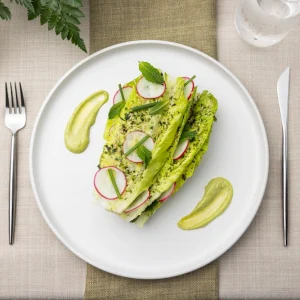
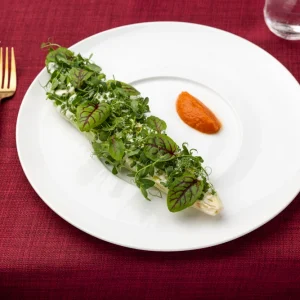
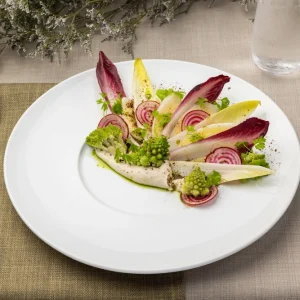
Entrées
Our entrées emphasize wholesome comfort, enhanced by global flavors and thoughtful techniques. The Citrus Brined Chicken, served with collard greens and crispy sage, is both hearty and bright, while the Su-Miso Arctic Char marries the richness of squash puree with the tartness of pickled plum and the bite of watercress.
Meat lovers will relish the Filet Mignon & Potato Pave, a dish elevated with caramelized onion and pickled cauliflower, bringing balance to the indulgence of tender beef. For plant-forward diners, the Citrus Brined Purple Cabbage and Parsnip Pave offer hearty yet refreshing options. Both are packed with flavor—whether it’s the dashi-infused “milk” and tangy miso of the cabbage dish or the creamy miso and earthy field greens paired with the parsnip pave.
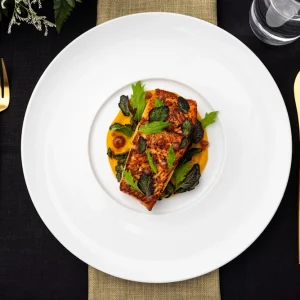
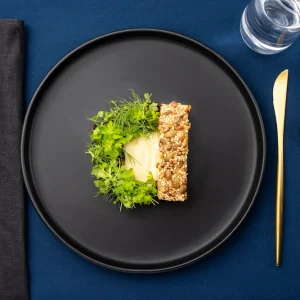
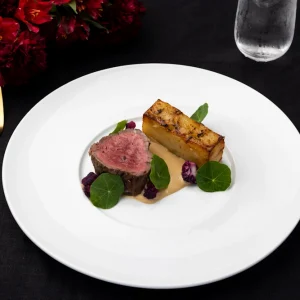
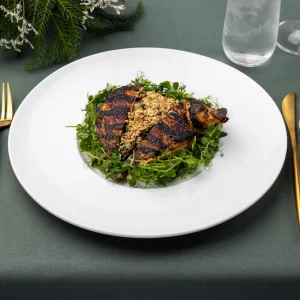
Desserts
Chef Geoffrey Koo’s desserts bring the perfect ending to any meal. His Dark Chocolate Ganache is a chocolate lover’s dream, with layers of texture and richness from the light brownie sponge to crisp chocolate caramel tuile. For a more adventurous palate, the Black Sesame Matcha Cake balances the earthy notes of sesame and matcha with a pop of sweetness from Concord grape gel. Think of it as an elevated PB&J – the comforting classic elevated to fine dining.
Seasonal favorites take center stage with the Pumpkin Spiced Cotton Cheesecake, where airy yuzu diplomat cream and tart cranberry fruit glass provide a light contrast to the spiced richness of the cake. The Maple Choux offers a unique fall twist, pairing spiced wine-poached pears with the smooth maple pastry cream and a hint of hibiscus for an unexpected floral note.

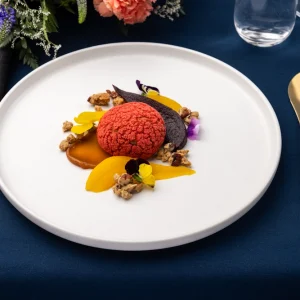
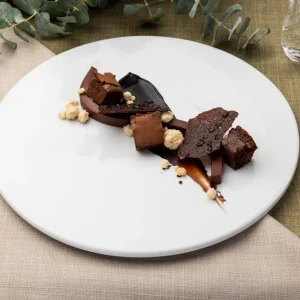

Sustainability at the Heart
Throughout this menu, our dedication to sustainability shines. Whether it’s the plant-forward dishes that reduce our environmental footprint or the careful sourcing of seasonal, organic ingredients, we’re constantly seeking ways to balance flavor with responsibility. Our vegan and vegetarian dishes provide satisfying options that contribute to both personal wellness and the planet’s health.
This menu is a reflection of the season’s bounty, brought to life through the craftsmanship and creativity of our culinary team. We invite you to savor the flavors of fall and winter, knowing that every dish is as thoughtful as it is delicious.
Check Out Our Fall / Winter Menu
There’s more on our menus – click the link below to check out our full catering menu and start imagining how delicious your next event with Great Performances could be!
As we said adieu to summer, our teams weren’t wasting any time getting ready for the September madness that started the instant the kids got back to school.
Coordinating all the details and ensuring each event goes smoothly is no casual feat. The high energy and pressure to deliver an incredible and perfect event every time fuels us to deliver delicious food, authentic service, and joyful hospitality. This is the moment we are all waiting for – a cross between a marathon and a sprint; high octane performance day after day. It activates our team spirit as each part of the company supports one another.
Our non-profit clients kick off fundraising season with galas, donor appreciation events and board gatherings. Corporations are hosting team building and business development events. Social gatherings included 15 weddings along with lifecycle celebrations. News and Documentary Emmys and the Latin Grammy’s joined the mix.
In addition to all of that excitement, September is Fashion Week and Climate Week. The UN General Assembly takes place just to make sure the traffic jams are that much more challenging for our fabulous logistics team. A presidential motorcade thrown in for extra chaos. (Our fleet of truck rolls at 4 AM!).
This year, we added in a handful of political events in time for, and our calendars have been blissfully overflowing! This is what we live for!
True to our name – Great Performances – we have always recognized that authentic hospitality experiences are theater with multiple acts and a cast of characters.
While we are happy to be the star of the show, we ecstatically welcome the opportunity to be behind the scenes in support of others…and nothing draws a crowd like a celeb chef!
It’s been a great few weeks for collaboration. For the 2nd year with worked with the Anne Saxelby Legacy Fund on their Chelsea Market Benefit event. Dozens of restaurateurs filled the hallways with incredible bites and GP was there to help. Being invisible and keeping up with the endless bussing is the job of unsung heroes.
We are gearing up for 2 legendary events in October: the New York City Wine & Food Festival and Cookies for Kids’ Cancer. GP has partnered with NYCWFF for a dozen years as the official caterer, providing kitchen space in our commissary for guest chefs for events like Burger Bash and working with countless brands and sponsors to get their product out to the thousands of participants.
‘Cookies’ is a spectacular fundraiser in the fight against childhood cancer. Each table has a chef preparing a unique meal from a fully equipped pop-up kitchen on the gala floor. I’ll name drop….Dan Kluger, Missy Robbins, Christina Tosi, Jonathan Benno and dozens more. GP works on set up, service and clean up – nothing sexy but just essential!
Our daily work with the James Beard Foundation at Platform by JBF at Pier 57 as the hospitality partner assisting every guest chef in the kitchen and the dinner guests with service, is the thrill of a lifetime.
Ali Rea Baum, Senior Event Director, is our seasoned and expert event planner who is laboring over these off premise events. “I truthfully love how different each of these events are, and how each one has their own personality. These events have an added complexity since GP is not supplying a standard catered menu. In the end, it is about creating an amazing experience for everyone from the client, to the planner, to the venue, to the guests!”
We are the bassline. Establishing rhythm, creating harmony, and providing a solid foundation for the main instrument. And we do it with pride!
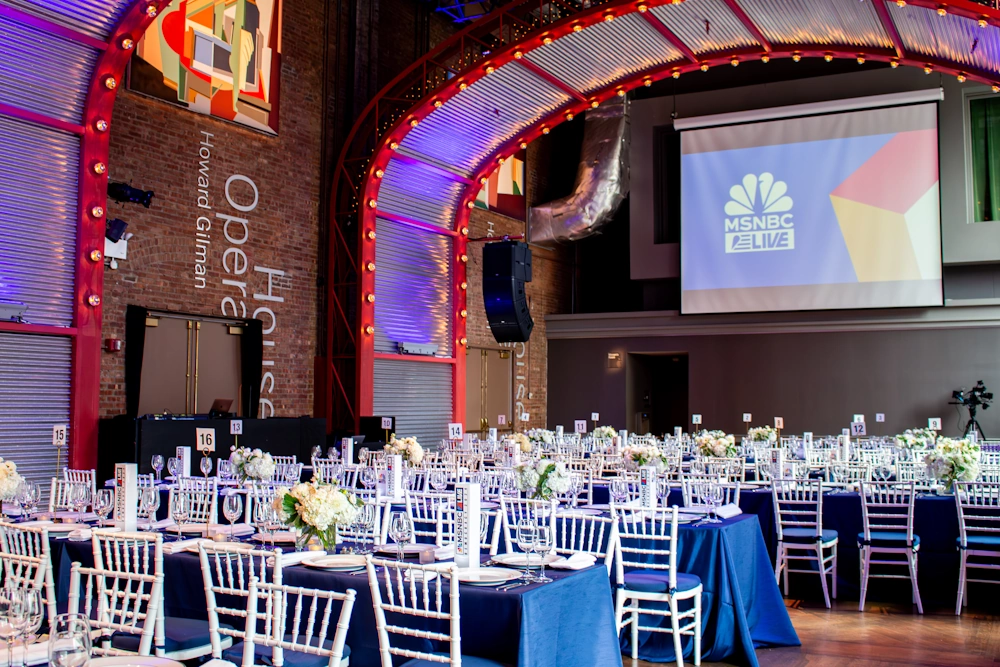
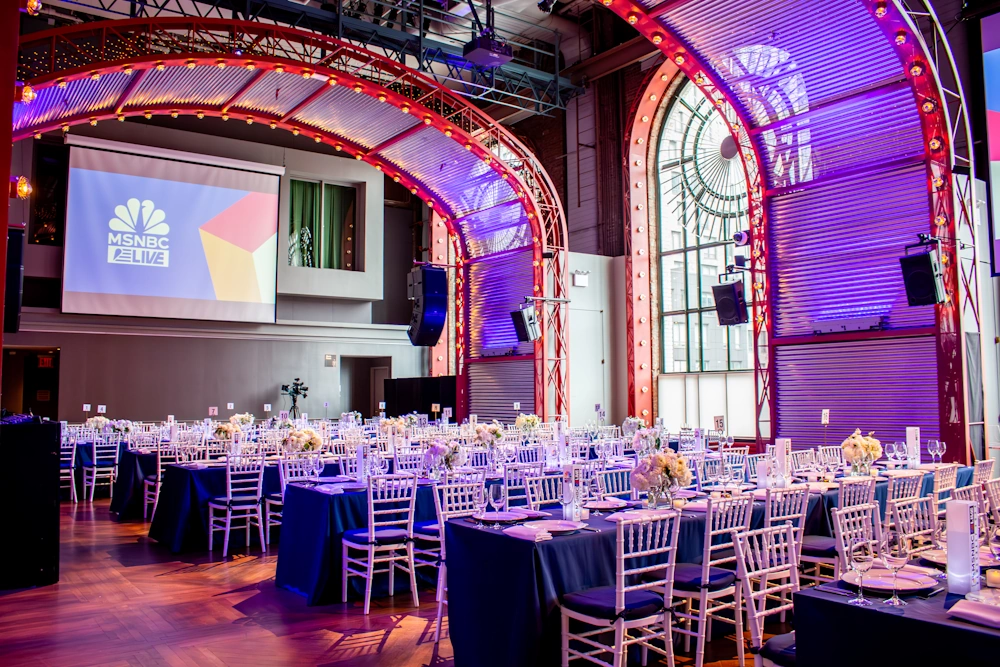
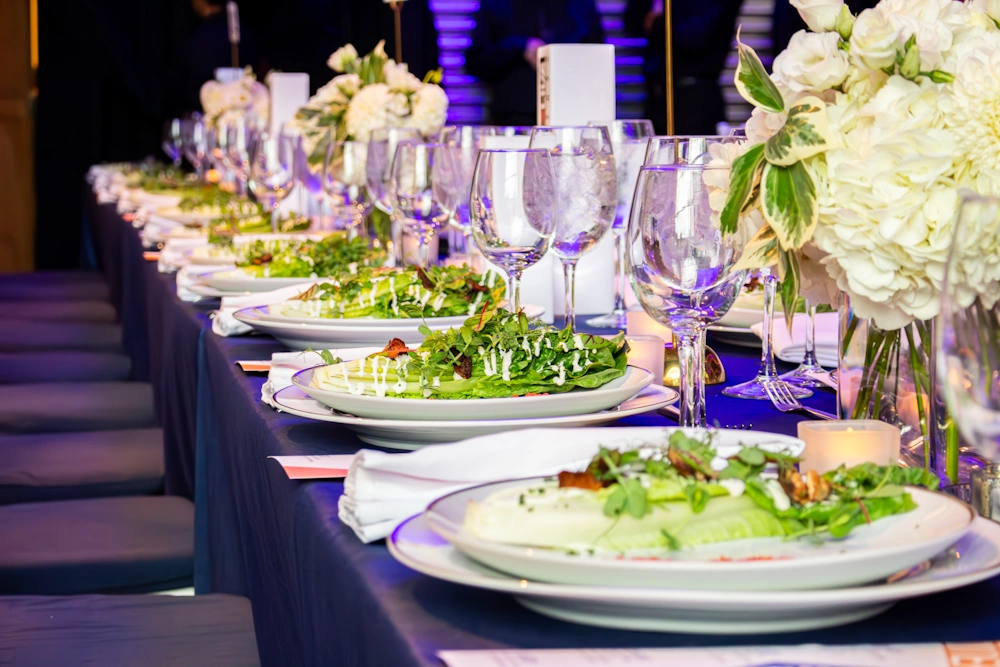
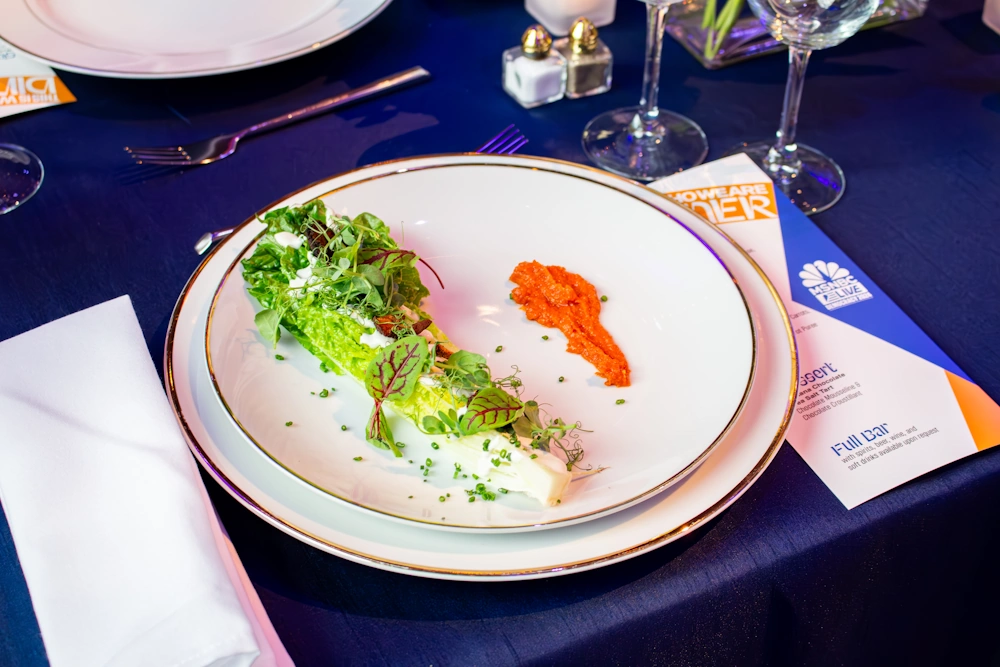
We often think of BAM as a center for culture, film, and theater, but it is home to so much more from dance, opera, and poetry to community events, galas, and talks. It’s the home for curious people and adventurous ideas, where people connect to learn, share, explore, and experiment.
Last month, BAM hosted MSNBC Live: Democracy 2024 and we were delighted to participate as the catering partner for BAM. Notable hosts and experts from MSNBC including Rachel Maddow, Steve Kornacki, Jen Psaki, and many more were gathered in one place, live on stage, leading thought-provoking, in-depth discussions about topics that matter most in the final weeks of this historic election cycle.
The highlight of the event was the “This is Who We Are Dinner and Reception”, a sold-out program held on September 7 at The Adam Space in the Peter Jay Sharp Building. Attendees enjoyed a delicious dinner prepared by Great Performances’ talented chefs as they heard directly from the MSNBC hosts, learning their personal insights and perspectives.
Gary Bedigan, Senior Event Producer at Great Performances, planned this event working closely with the teams from MSNBC and BAM, to ensure a flawlessly executed event. We worked with Party Rental Ltd on the equipment and rental furniture, and Botanica provided the floral arrangements for the table, creating a dynamic space for the lively conversations that followed the presentations and discussions. The high ceilings and floor-to-ceiling windows provided an uplifting space to discuss the future of democracy in the world. The lively conversations were filled with hope and optimism, echoed by the twinkling lights that spanned the arches and along the windows of The Adam Space.
The seated dinner included a full bar and a selection of beer and wine, attended by a full complement of staff.
MSNBC Live: This is Who We Are Dinner and Reception Menu
First Course
GP Fall Wedge Salad – romaine, blue cheese mousse, sundried tomato, mushroom, chive, affilla cress
Entrée
Glazed Short Rib and Charred Tomato – roasted baby heirloom carrots, charred tomato, end of summer carrot puree
Plated Dessert
Banana Chocolate Sea Salt Tart – chocolate mousseline, chocolate croustillant







